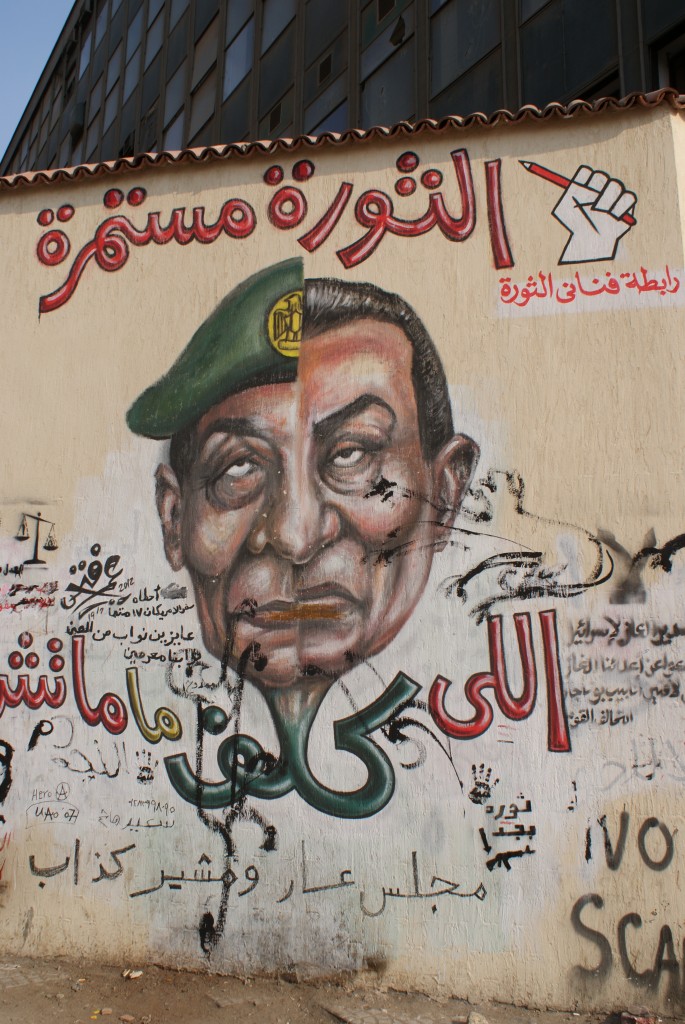The leadership vacuum in Egypt is centuries old
By Khaled Diab
Decades of authoritarianism and centuries of non-indigenous rule have led to a shortage of effective native leaders in Egypt, derailing the revolution.

Thursday 25 December 2014
Hosni Mubarak, the face which launched thousands of street protests, was cleared of ordering the killing of hundreds of protesters and numerous corruption charges related to his three decades on Egypt's republican throne were also dropped.
The news of the ex-dictator's acquittal has hit activists and pro-revolution Egyptians like a rude kick in the groin, leading to angry protests on campuses across the country. The man who symbolized everything that was wrong with Egypt in 2011 walked scot free under the auspices of the man who presides over everything that's wrong with Egypt in 2014: Abdel-Fattah al-Sisi.
By walking free, Mubarak – who inadvertently gave birth to the Egyptian revolution when he stepped down – may harken the revolution's death knell, at least for the time being.
Some believe the situation is even worse. Writing in the Washington Post, Eric Trager argued that “the ‘revolution' didn't die… a true revolution never happened in the first place.” Trager contends that the uprising in Egypt not only failed to bring about revolutionary change, a substantial percentage of the population did not desire it, wishing only for elusive “stability”.
What his assertion overlooks is that many revolutions fail to bring about the radical change they seek, such as the 1848 Spring of Nations revolutionary wave in Europe.
Moreover, if significant opposition is a yardstick, then many of the world's most iconic revolutions would not qualify as such, including in America and France. Besides, if history is any indication it's far too early to call the final outcome of the Egyptian revolution, since its French predecessor took generations before it achieved its goals of “liberté, egalité, fraternité”.
Despite Trager's assertions, it is not apathy or the longing for stability that have foiled Egypt's revolutionary aspirations.
In my view, it is a question of leadership and its accompanying political culture. On the one hand, there is the deep state which has robustly done everything within its power not to cede power. On the other, it is the leaderless nature of the revolution, which was a strength at first because it made it impossible for the state to control, but became a liability later when strong leadership was urgently required to give the popular uprising direction.
The immediate reason for this was Hosni Mubarak's 30-odd years of autocratic rule, which deepened the state's grip on power while eliminating viable alternative leaderships. This followed the preceding three decades of similar dictatorial rule, in the shape of Anwar al-Sadat and Gamal Abdel-Nasser before him.
Some interpret this as a manifestation of some kind of ancient Pharaoh complex on the part of Egyptian leaders. But this reductionist interpretation fails to explain why most of the region's leadership is likewise deluded, even though their countries were not part of the Ancient Egyptian tradition of the absolute god-king.
Personally, I think Egypt and the Arab world's leadership crisis can best be attributed to centuries of foreign rule and domination. This had the dual effect of destroying or downgrading the indigenous cadre of leaders and putting in place a damaging leadership culture.
In Egypt's case, before Mohamed Naguib's rise to power in 1952, one must go back nearly two and a half millennia to find Egypt's last native leader: Nectanebo II, who was overthrown in 342BC by a combined Greek and Persian force.
Though Alexander the Great was regarded as a liberator from Persian rule in Egypt – and even the illegitimate son of Egypt's last pharaoh – and the Ptolemaic dynasty regarded themselves as pharaohs, the Egyptian political and social order was stacked in favor of ethnic Greeks and a Greek-speaking Egyptian elite, leading to numerous rebellions, including the “great revolt” of 205-186 BC.
In the two millennia since the death of the last Ptolemaic pharaoh, the legendary Cleopatra VII, Egypt's fortunes have waxed and waned. Roman rule retained the relative privilege of Egyptian Greeks while adding another layer of exploitation, transforming this fertile, rich country into Rome's grain silo.
Even when Egypt went from being a province to being an independent imperial power, these Nile-based empires were invariably foreign ones in which the locals were marginalized and largely excluded from the corridors of power. This was the case with the mighty and largely religiously tolerant Fatimid caliphate, which established glittering Cairo near ancient Memphis in the tenth century.
The Mamluk era (1250–1517) saw the novel situation of Egypt being ruled by a caste of warrior slaves. Though Egypt thrived economically and culturally, the centuries of Mamluk rule witnessed chaotic and bloody transitions of power between competing pretenders. Despite the infighting, the Mamluks agreed on one thing: though ostensibly slaves, they were the “true lords” while the supposedly freeborn native Egyptians were their serfs.
When the Ottomans conquered Egypt, they retained the Mamluks as their vassals which, like the Roman era, doubled the tax burden on the Egyptian masses, with a share going towards subsiding the ruling elite's lavish lifestyles and a share going to Constantinople.
In the early 19th century, Egypt was purged of its Mamluks by a commander in the Ottoman Empire who wanted the country all to himself: Muhammad Ali, who had officially come to reclaim Egypt for the Sultan after Napoleon's short-lived and disastrous occupation.
Despite being Albanian, Ali is widely regarded as being the father of modern Egypt. Wishing to create a modern state along European lines, he realised the importance of harnessing, educating and empowering (somewhat) the native Egyptian population.
Ali not only developed an advanced industrial base for the country, he also built a modern army, bureaucracy and education system where Egyptian citizens could find opportunities for mobility beyond the farming and industry to which they were previously confined.
But Ali retained the Mamluks fixation on militarism and he was obsessed with building a European-style army to carve out an empire for his dynasty. This placed a huge burden on Egypt's peasantry in the form of high taxation and conscription.
Given the centuries of militarism of the ruling foreign elites and how the army had become one of the few means of social mobility for the native population, it is no surprise that Egypt's first modern nationalist leader with any real authority was an army officer, Ahmed Urabi.
Urabi's rebellion against the vassal Khedive Tawfiq, which threatened Anglo-French interests, led the British to formally occupy Egypt, though they kept the Muhammad Ali dynasty in power as clients. Following the heavy burden placed on Egypt during World War I, opposition to British rule grew massively, leading to the 1919 revolution.
The revolution succeeded in gaining only partial independence for Egypt and resulted in a liberal, democratic parliament, though one that was largely toothless due to the combined influence of the palace and the British.
The seething dissatisfaction with this arrangement led to widespread protests following World War II, but it was only the army that proved to have the clout to dislodge the king and the waning British.
But rather than hand over power to an elected parliament as the Free Officers had promised after an initial transition, the lure of power proved too irresistible. Although Egypt's new rulers were native Egyptians, rather than dismantle the centuries of imperial legacy hobbling their fellow citizens, they kept in place many of the timeworn instruments of repression and marginalisation, despite some reforms.
Like Egypt's various foreign rulers, the new officer elite viewed with suspicion any contenders or opponents, crushing and suppressing rivals. Hosni Mubarak went so far as not even to appoint a vice-president.
This centuries-long legacy helped lead to the leaderless revolution of 2011. This does not mean that Egypt is void of talent that can govern the country fairly and effectively. There is plenty of that. However, Egypt's political culture does not encourage this talent to rise and there are no mechanisms for the peaceful and smooth transfer of power.
____
Follow Khaled Diab on Twitter.
This is an extended version of an article which first appeared in Haaretz on 10 December 2014.

